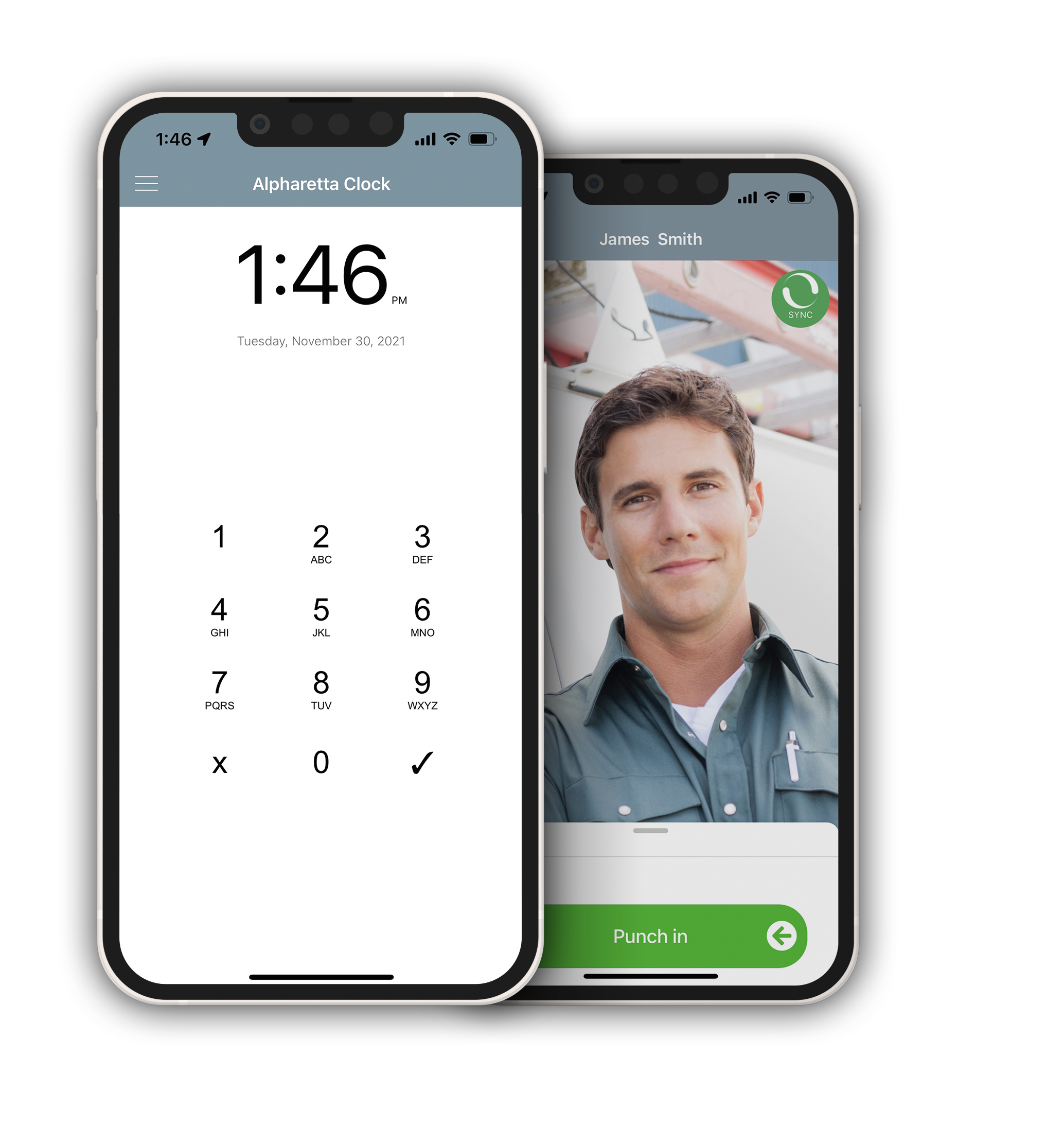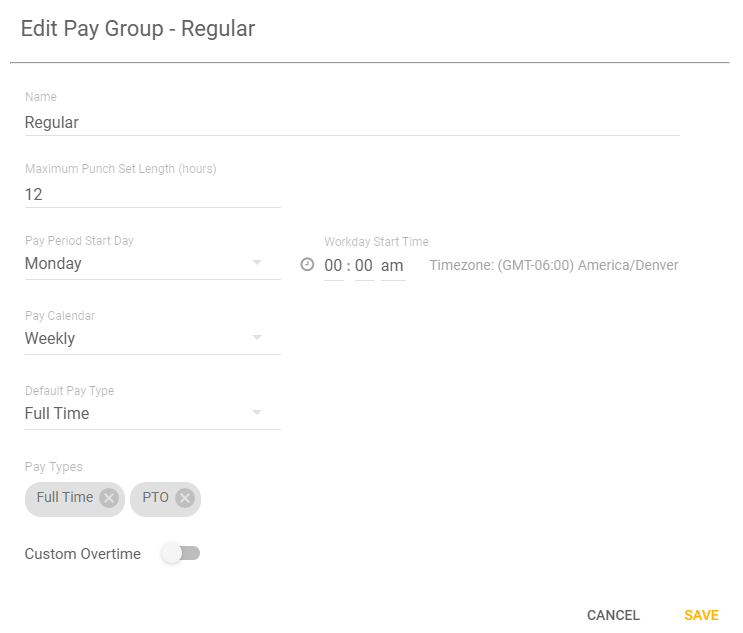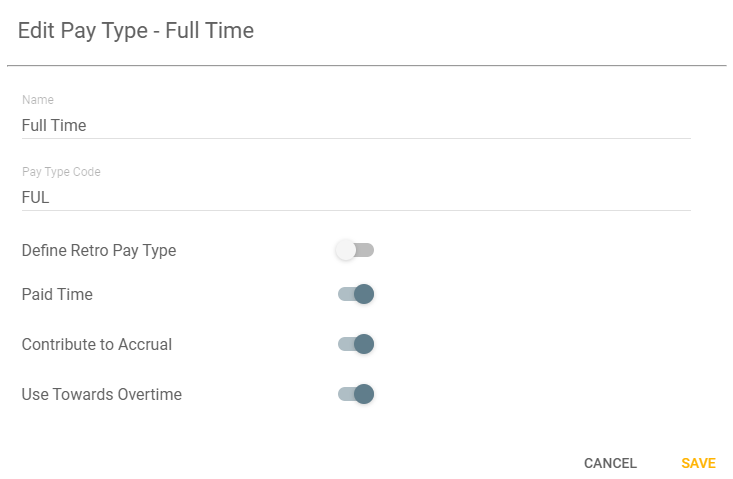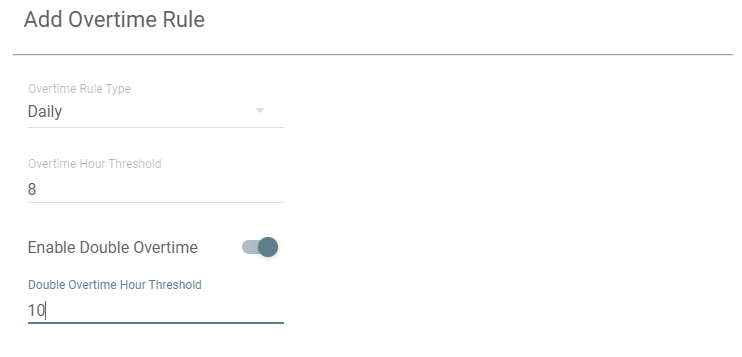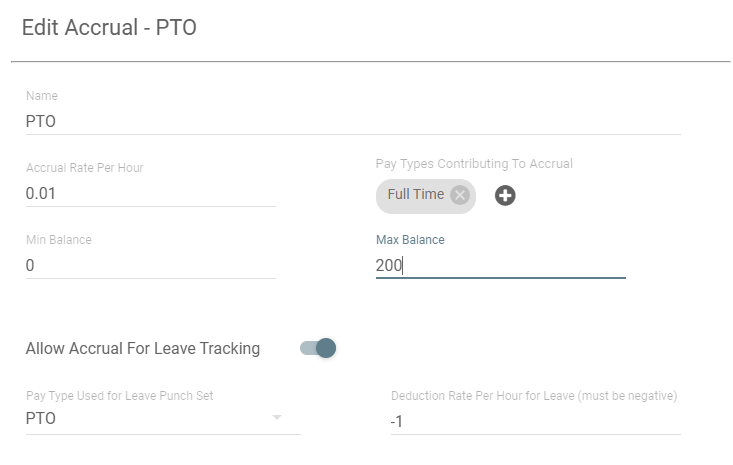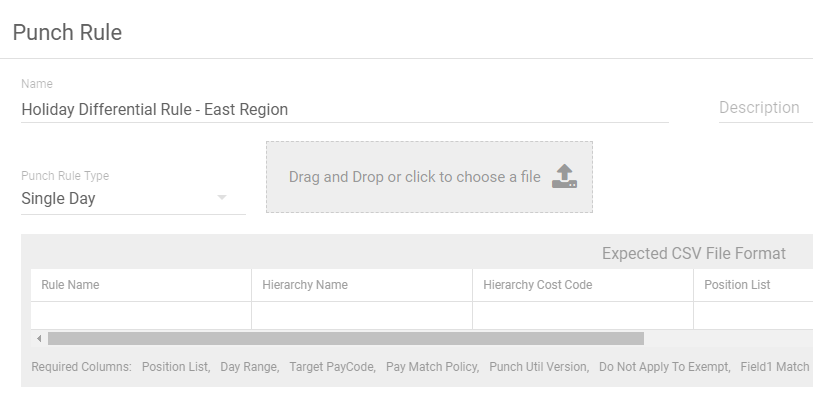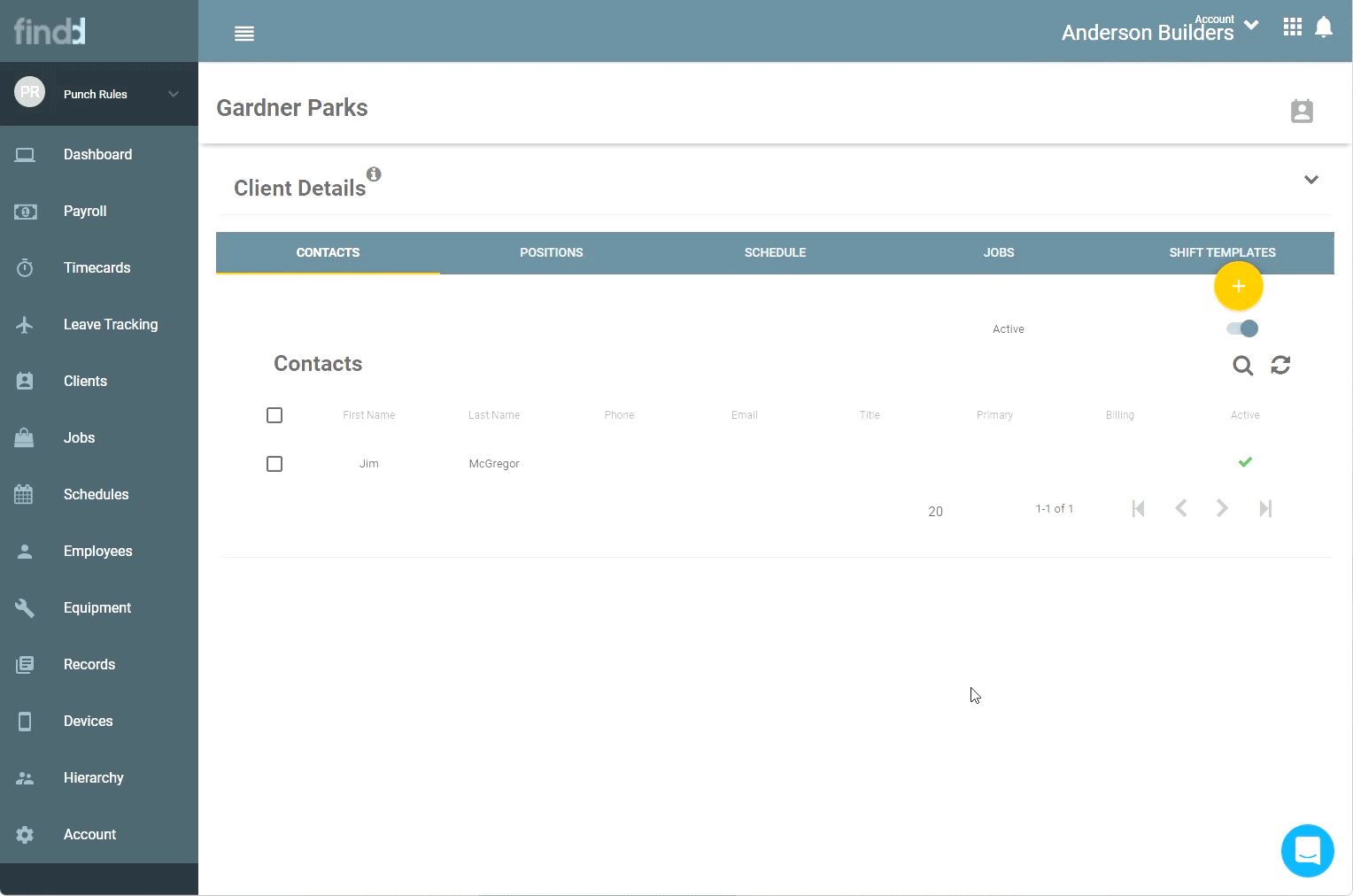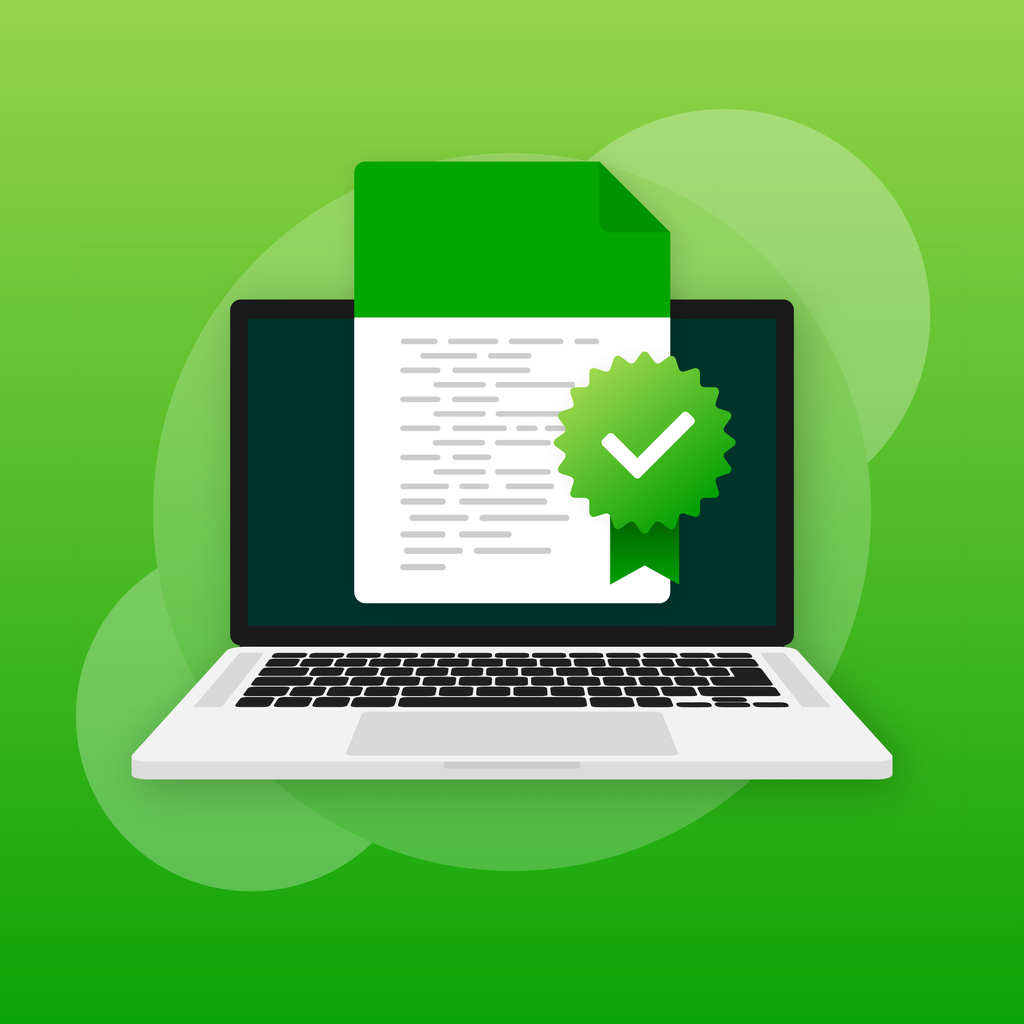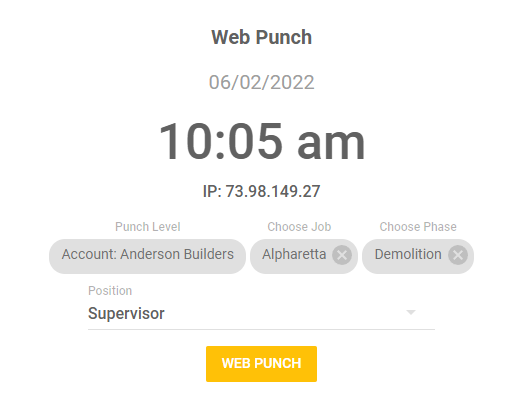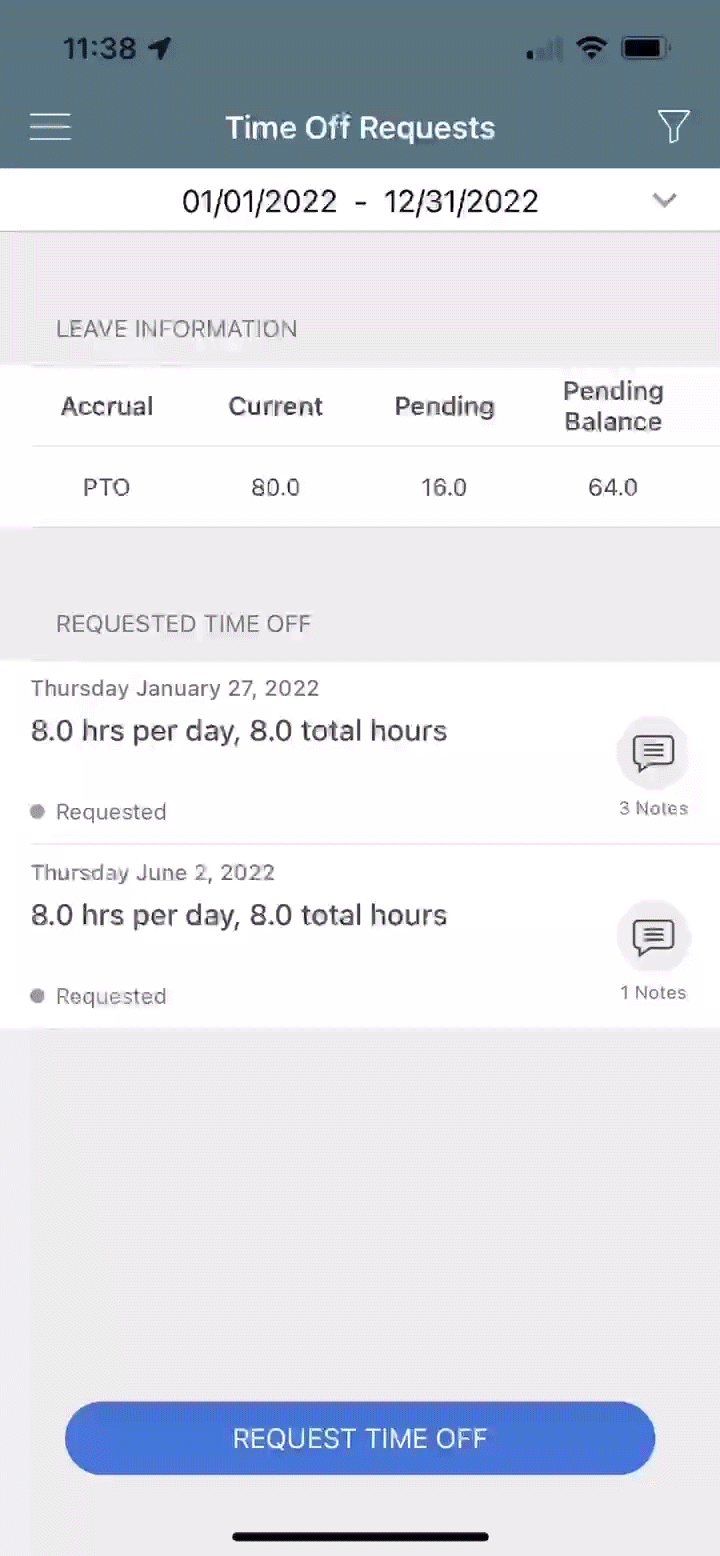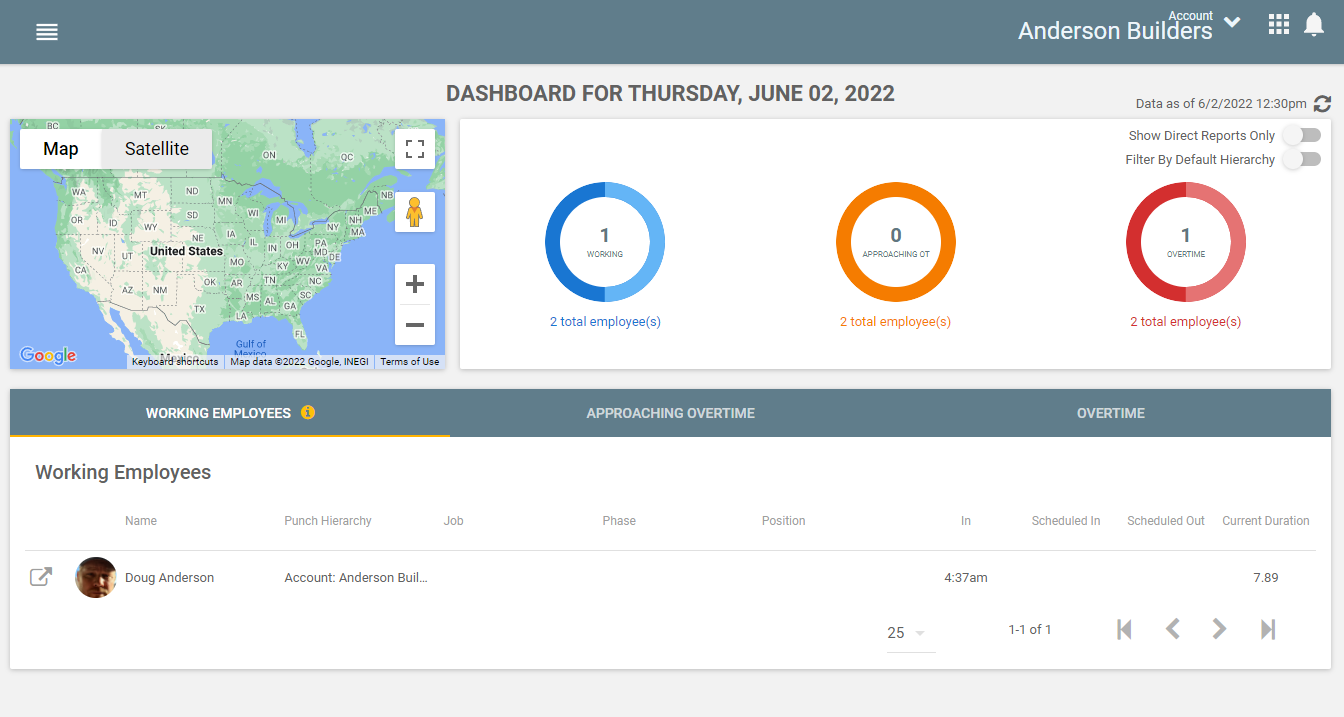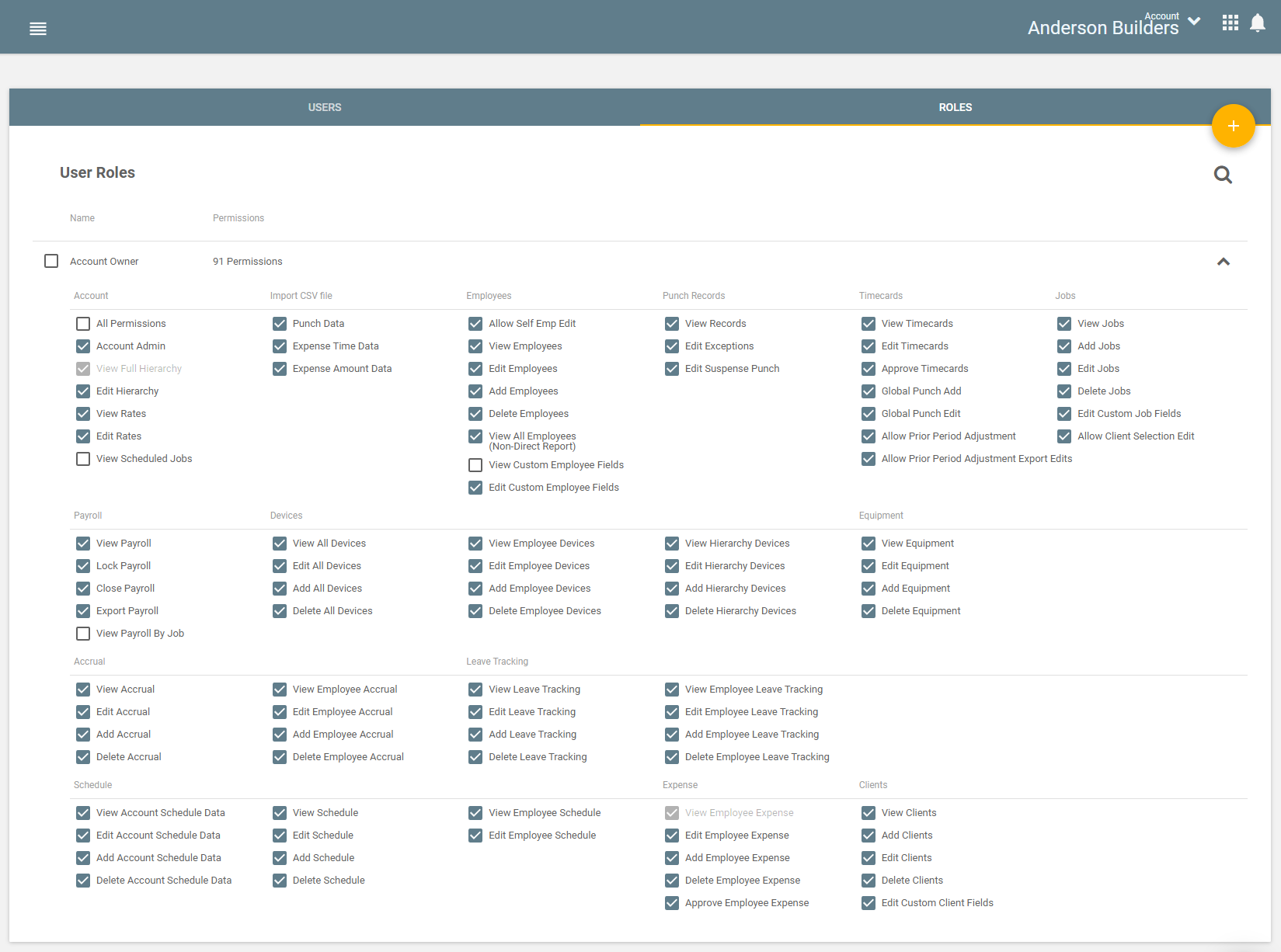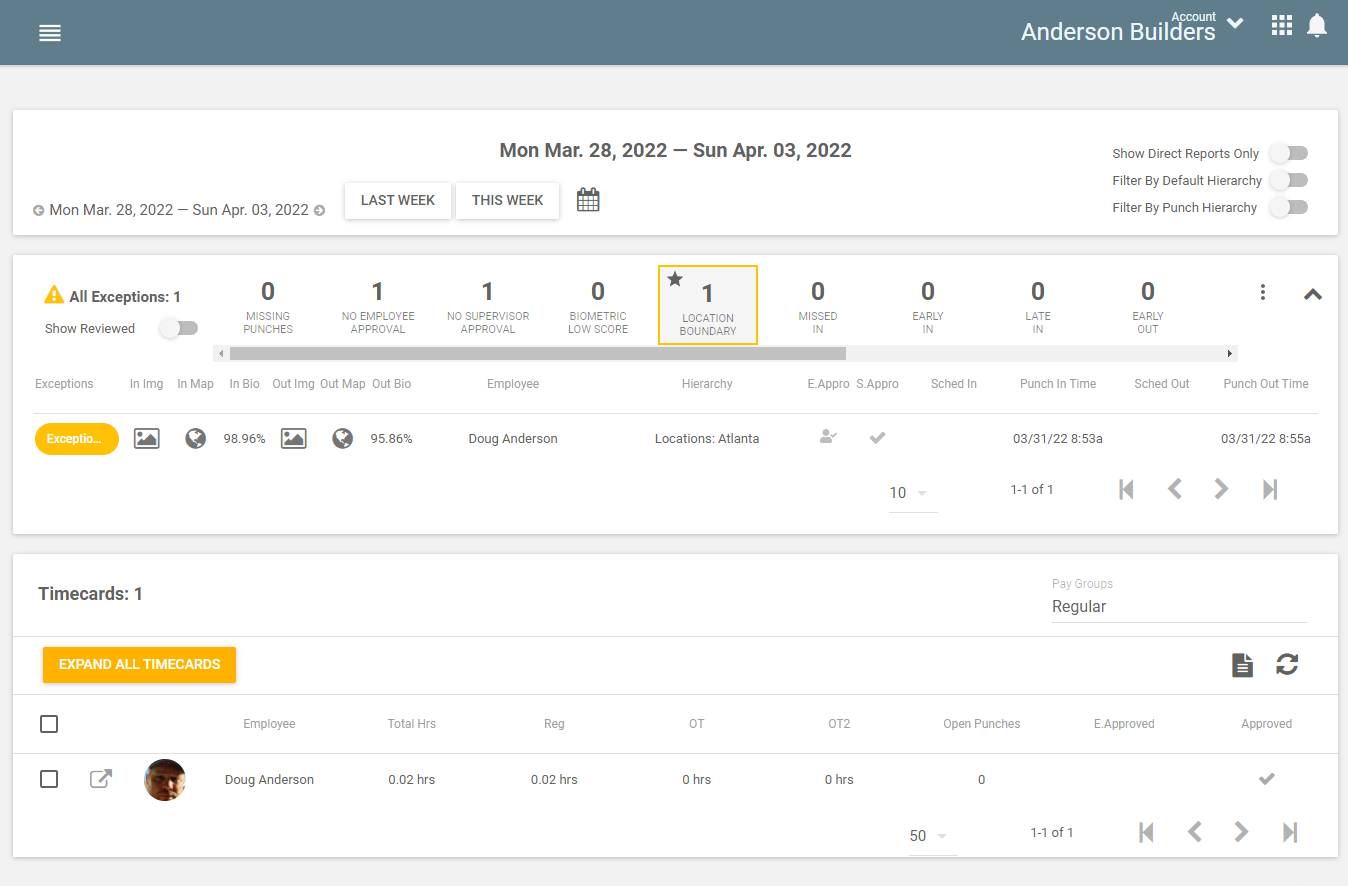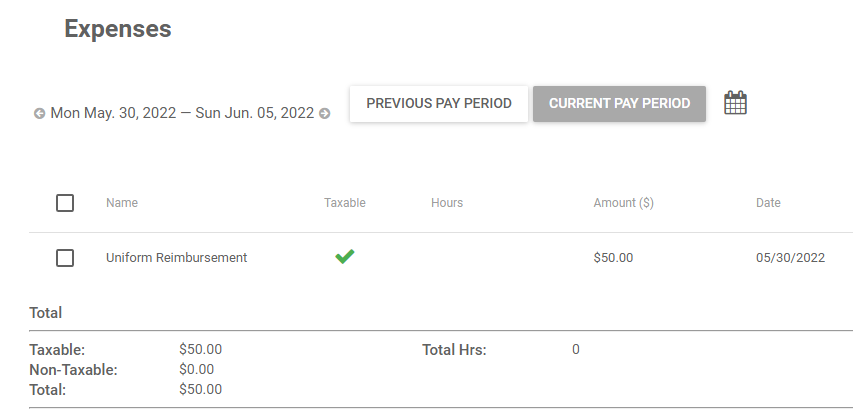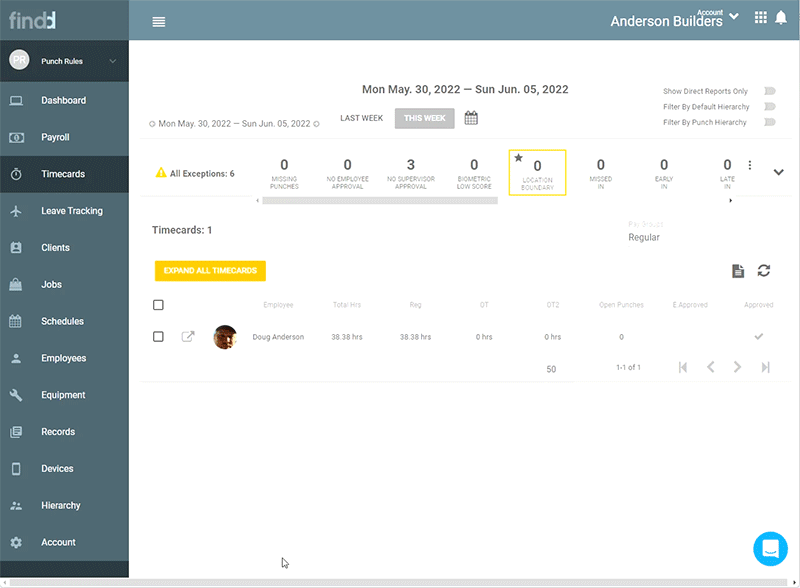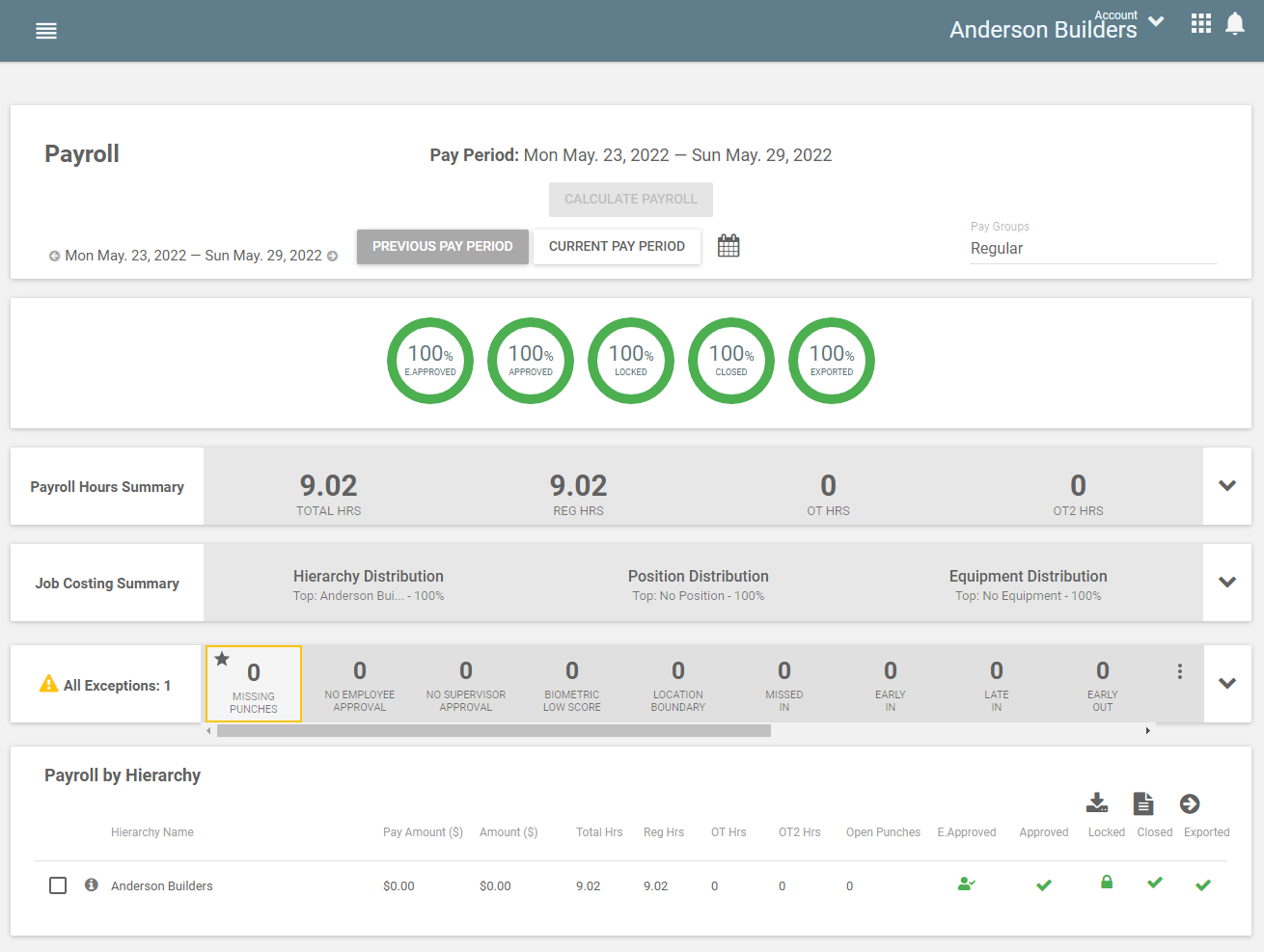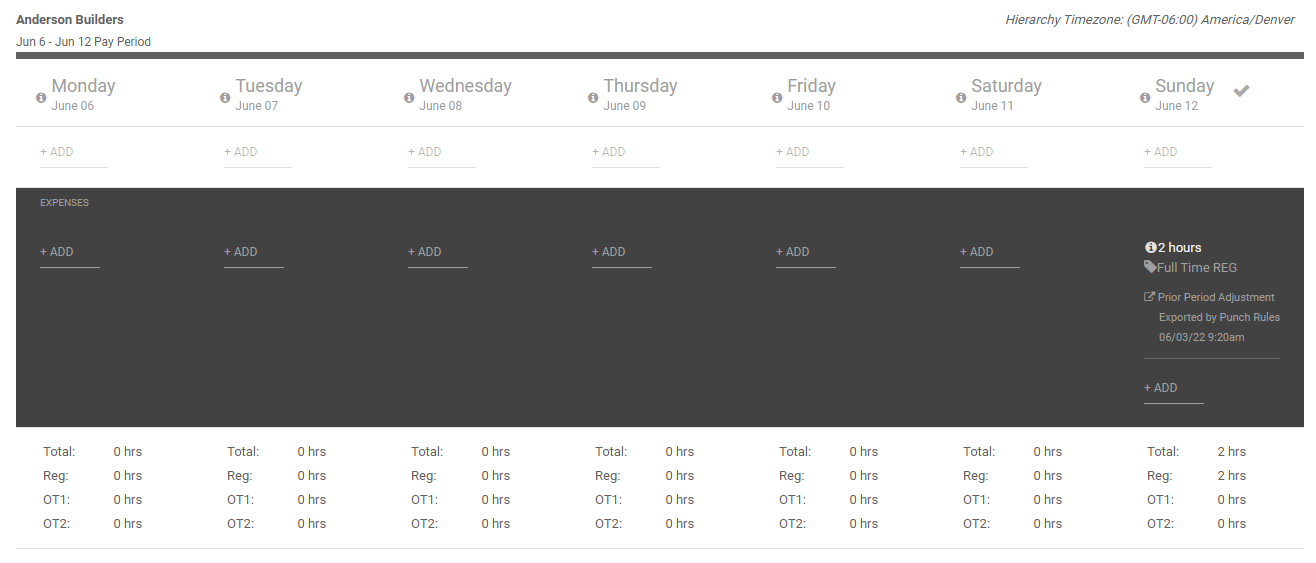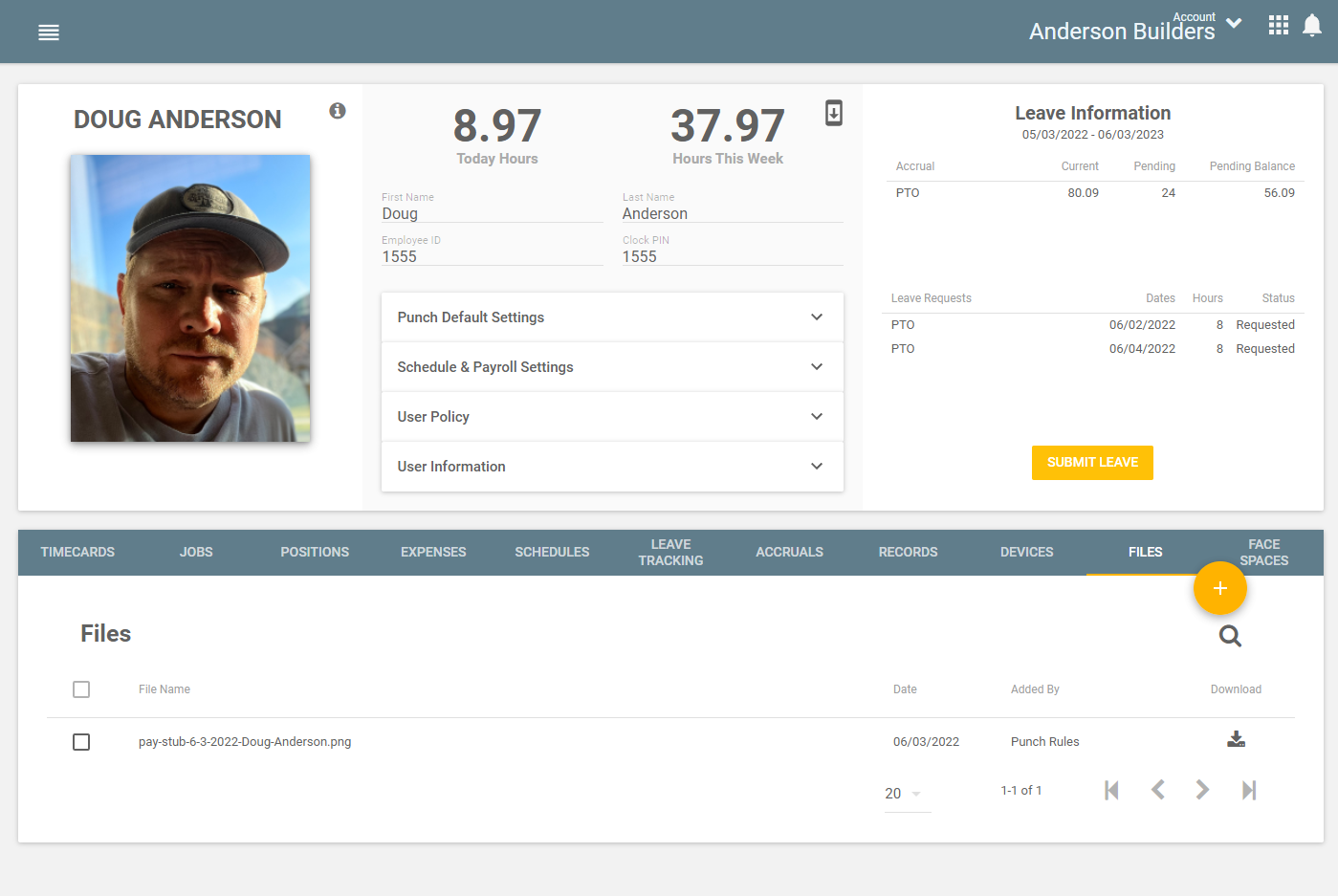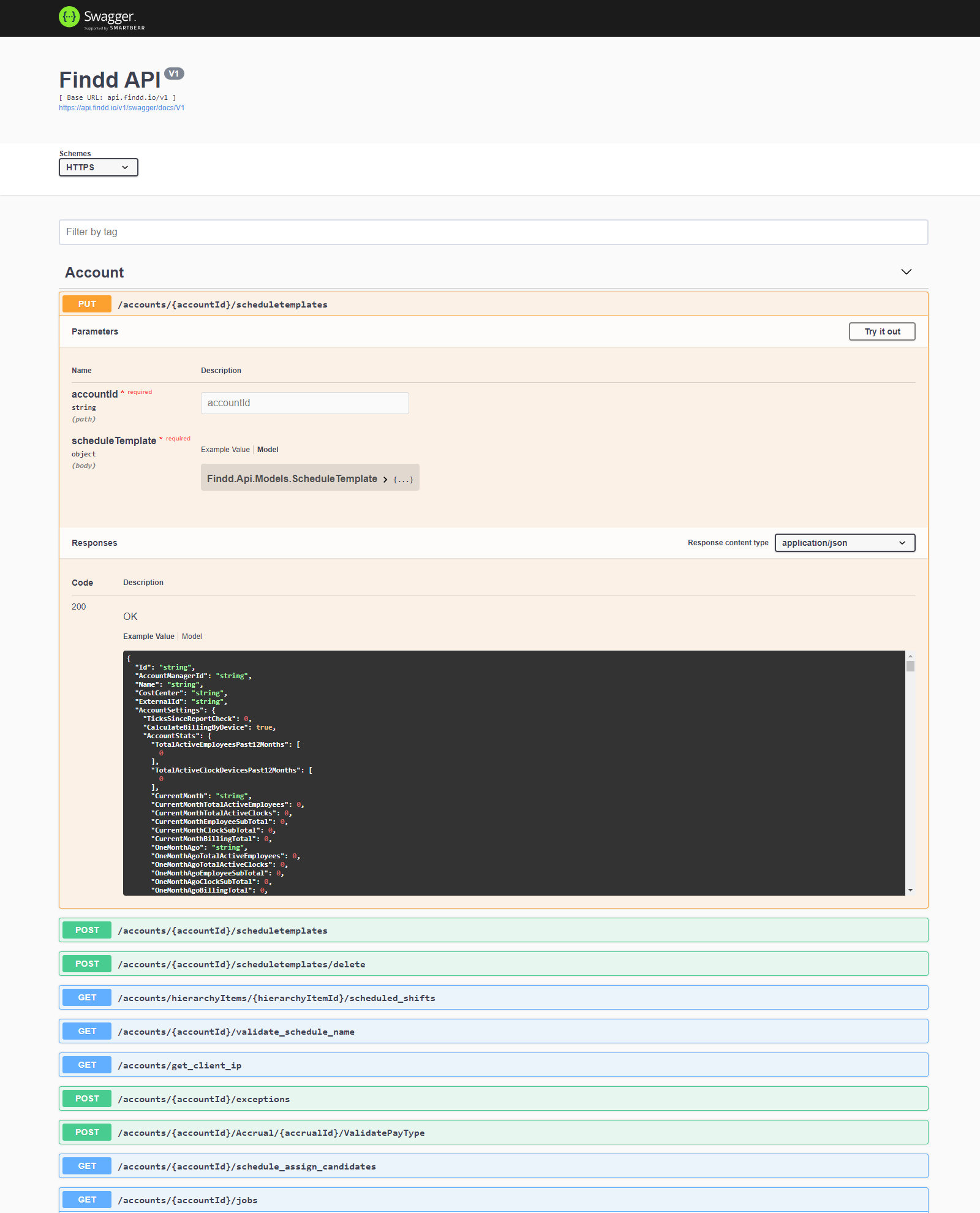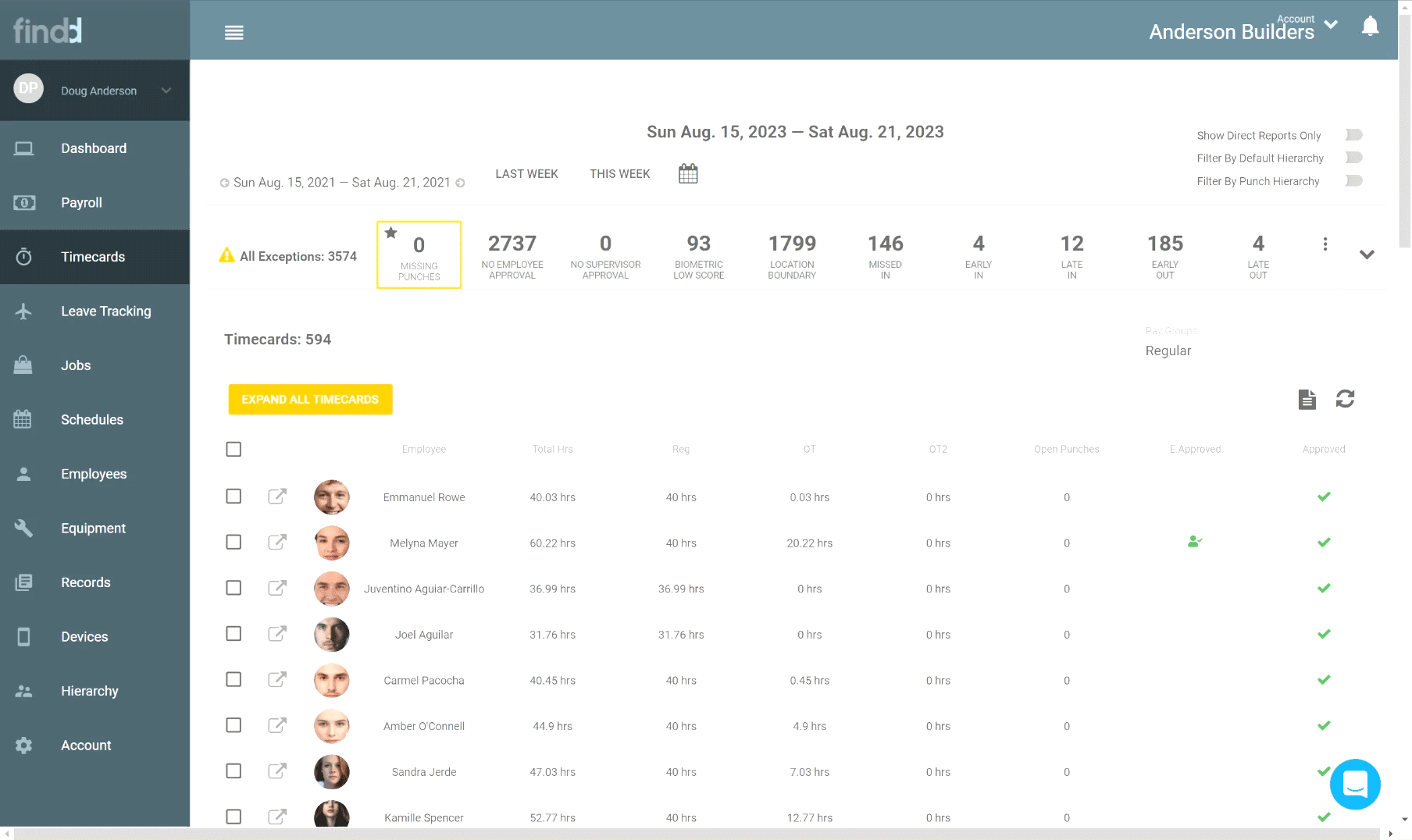Most Popular Features
One platform for all of your employee time and labor needs
Data Import
Configuration
Time Collection
Payroll Preparation
Data Export
Data Import
Findd integrates with virtually all third-party payroll, HCM, and/or time systems. Proper integration is critical for success because the Findd system can function as a simple time clock or as a full-time and labor management system. So whether your needs are basic or advanced, importing the right data will save time and money.
Integrations
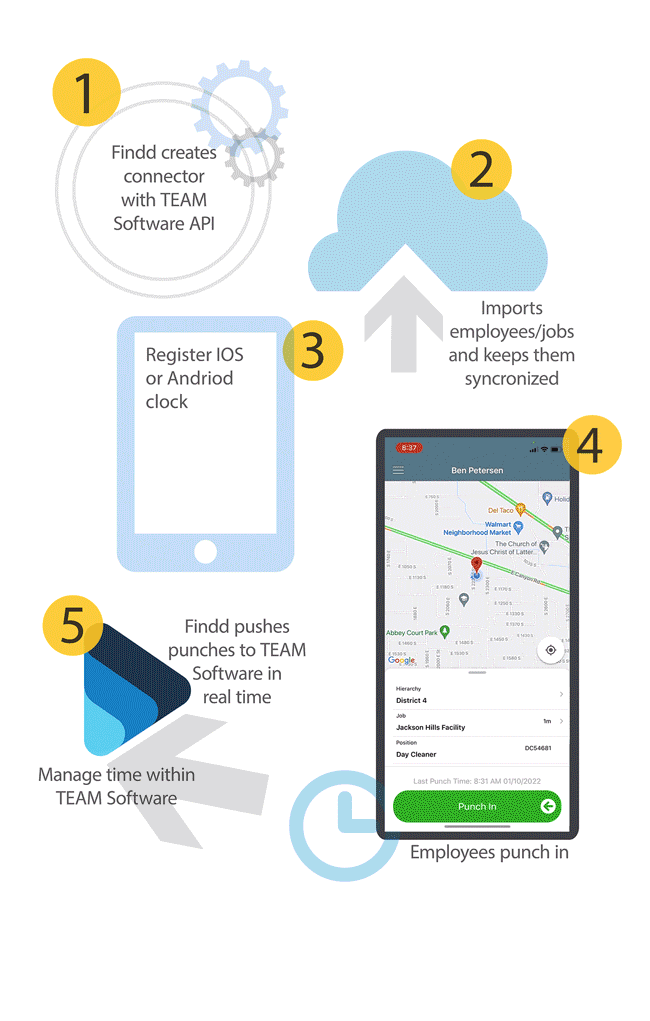
Employee Import
Findd continuously connects with your records management system to import employee demographic information. From simple imports of name and employee ID, to complex imports like accruals, Findd handles it all!
Hierarchy Import
Organizing administrators and employees via a defined hierarchy is critical to maintaining control of punch permissions, supervisor approval workflows, and payroll preparation, validation, and export. The Findd import can map your source system hierarchy and import all changes continuously.
Job Import
Findd gives you the ability to import jobs to match the specific locations where your employees will punch in and out. With job import, never leave your employees wondering where to work or how to allocate time.
Position Import
Positions are optional and can be used to categorize the work being done by the employee. Because positions are chosen by the employee at the clock, importing the proper employee positions on an ongoing basis is critical to keep punch and job costing data accurate.
Pay Type Import
Findd allows you to categorize and define pay types for your employees. This includes regular pay types, differential pay types, or special pay types that require pay classes.
Supervisor Assignment Import
Many larger companies have layers of administration and supervision over their workers. By importing supervisor and administrative user assignments and positions, proper exception review, timecard review, and punch job costing can be conducted.
Punch Questions
Punch questions, such as COVID pre-screening questions, questions about injuries suffered during a shift, or any custom questions required by your organization can be imported from an external source.
Configuration
Findd is built with both the simple or complex use-case in mind. From a small 5-10 employee operation, to some of the largest employers in the world with thousands of complex punch rules, the Findd time system can be configured to handle every scenario.
Hierarchy
Establishing a defined hierarchy is essential to managing the complexities of administrative and supervisor permissions, employee assignments, and job costing. With Findd’s hierarchy management capabilities, your hierarchy can be as simple or complex as your business requires. Whether your hierarchy is a single list or a massive network of regions and departments, Findd can handle it all. Additionally, Findd allows you to configure each member of your hierarchy independently, setting punch rules, GPS auto-snapping, and unique permissions for each member to meet your business needs.
Scheduling
Using Findd’s advanced scheduling system is optional, but recommended. By redefining shift templates, master schedule templates, and client schedule templates, the Findd system offers maximum flexibility and reusability. Schedules are assigned by hierarchy and job so your administrators, supervisors, and employees will see the information that is relevant to them without having to dig through all sorts of irrelevant scheduling data. Combined with shift syncing to the employee’s mobile device and the ability to handle offline punching, scheduling is an extremely powerful tool.
Pay Groups
Customizing pay groups allows an organization to define groups of employees based on settings such as pay calendars, overtime rules, available pay types, and more.
Pay Types
Pay types define how a time duration is handled in terms of overtime calculation, accruals, and whether the time is paid or not. Further, the pay code from the pay type may be used in the payroll export.
Pay Classes
It is common to want control for pay and bill rates by employee position and pay type. Pay class allows for the definition of pay rate, bill rate, burden, OT and OT2 factors per pay type for use in job budgeting and payroll.
Overtime
Findd includes support for standard 40-hour per week overtime and California overtime calculations. Additionally, custom overtime rules can be created for daily OT/O2, Weekly OT/OT2, as well as consecutive day OT/OT2.
Accruals / Leave Tracking
Leave requests workflows with full support for accruals can set up as accrual rules or imported into the Findd time system. Users can request time off from their mobile and supervisors can view and approve/reject/message the employee about each request. Processing payroll will process all accrual balances as well. Accrual start date, probation date, as well as yearly accrual grants can also be configured. Both simple and sophisticated holiday setup is also supported including shift differentials by holiday, position, employee type, etc.
Punch Rules
It is often necessary to calculate punch shift differentials based on complex rules. For example, an employee may be entitled to extra pay when working a job that is hazardous, requires extra travel, or is at an odd time like a night shift. Punch rules are completely flexible and can be configured to handle any situation. From shift differentials to holidays, to per diem pay for certain jobs, the Findd implementation team can help configure punch rules to handle even your most sophisticated needs.
Punch Permissions
It is important for any organization to be able to control where an employee has permission to punch. With Findd’s sophisticated n-level hierarchy, as well as full job management functionality, punch permissions can be perfectly tuned to allow an employee the rights to only those locations that they are allowed. This avoids coding errors on time and helps ensure accurate time data. With Geofencing and Microlocations, employees can punch into the proper location with ease.
Job Management
For many companies, jobs come and go. The ability to configure jobs with a specific duration, location, phases, schedule, settings, client assignment, supervisor user, and employee assignments is a must. Findd handles even the most complex job assignment scenarios.
Client Management
The Findd time system allows for client management. This includes clients organized by hierarchies, client contacts, notes, jobs, schedules, and more.
Custom Payroll Export
Once employee time has been gathered, approved, and reviewed for export, a payroll file must be produced to be consumed by an external payroll system. Although Findd integrates with the world’s most common payroll systems, each payroll configuration can be unique. Findd allows for a specific payroll format to be configured based on your exact needs.
Punch Questions
Punch questions can be configured to follow specific workflows based on previous question answers. Questions and answers can be configured to trigger a special alert, called an exception, to be brought to the attention of the supervisor. Punch questions can be asked before punch in, before punch out, or only one time per day. Because they are highly configurable, punch questions can handle a wide range of scenarios help you better gather required information every day. Unlike other survey systems, because the punch question can be required to be answered before allowing punching you are 100% ensured to get al of your employees to answer these questions every time you ask.
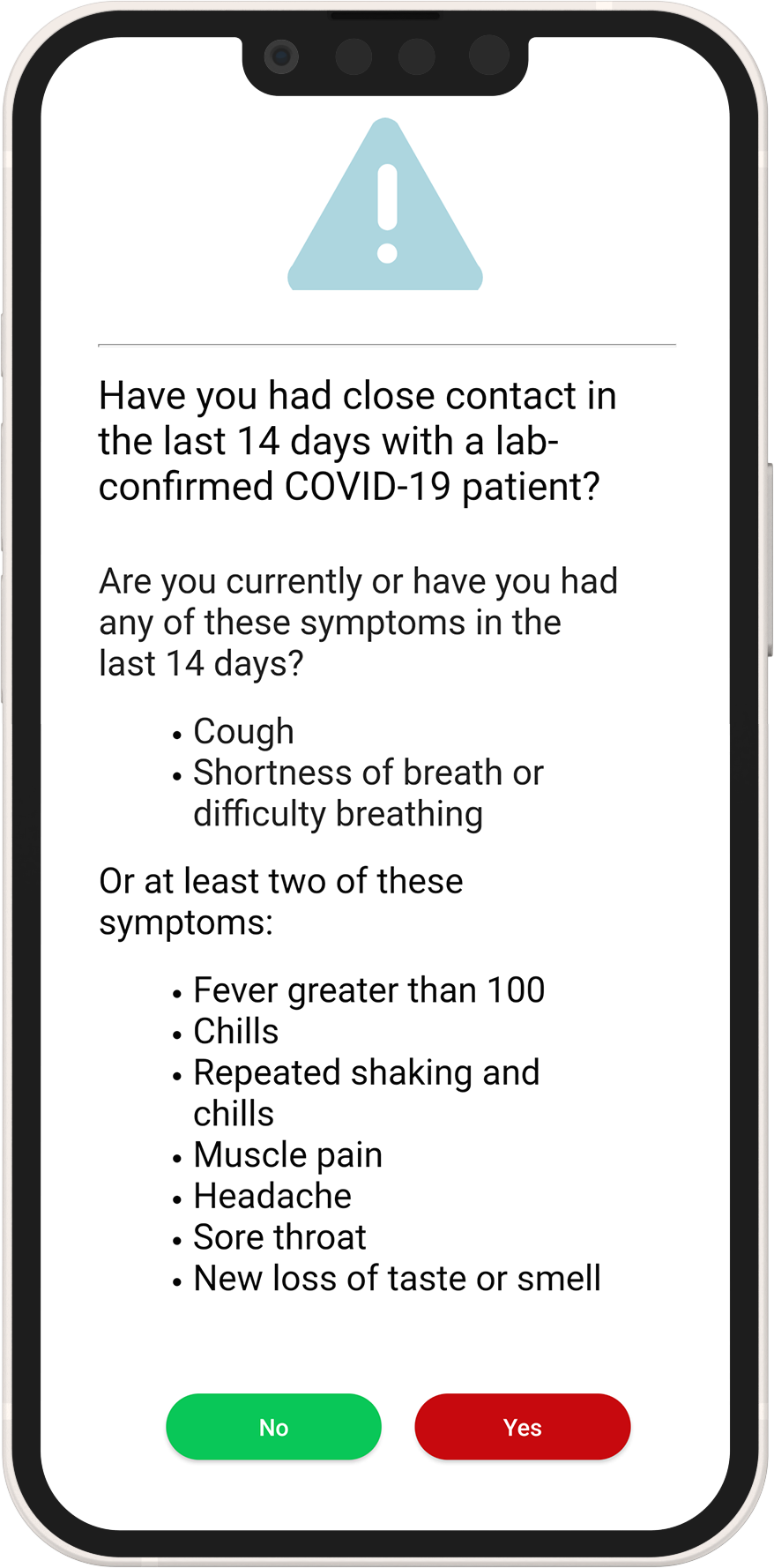
Time Collection
Nothing else matters if time collection isn’t simple to use, able to prevent fraud, and is administratively efficient when preparing for payroll processing. Findd is the world’s most advanced mobile time clock. The entire punch sequence functions offline and uses a background sync technology unique to Findd. What does this mean? There is no connectivity situation that will prevent your employees from geofencing, facial recognition, auto-snapping the correct job, hierarchy, position, phase, shift, and punch questions. In short, your employees can focus on getting to work. No more “exceptions” where the employee cannot punch in due to some technical problem, and no more getting the supervisor involved to add manual punches. Findd has revolutionized the punch clock experience.
Mobile Punching
Mobile punching is the heart of the Findd time system. If the experience for the employee isn’t seamless and effortless, it opens up the process to both errors and fraud. Findd fully supports an offline punch sequence. Any Android or iOS device can be turned into an individual’s clock, or a multi-employee timeclock. Both have distinct use-cases.
iOS / Android App
The Findd mobile app is supported on virtually all iOS or Android devices that are newer than 5-7 years old. This means you can turn any tablet or smartphone into a biometric, geofenced timeclock. Once the application is downloaded, registration is simple and an employee is never required to create a username/password.
Punch Data
Punching using Findd on mobile is meant to be flexible. The only data required to punch is simply a hierarchy. Every employee should be set up with a default hierarchy to make this process easy (this hierarchy is configured to match the structure of your company). Shift, position, equipment, job and phase are all optional job-costing details that can also be required to meet the needs of your operations. Because all jobs are within a hierarchy, and all phases are tied to jobs, the selection of the correct data is simple for the employee. Additionally, this categorization of punch time can be edited as part of the mobile timecard self-service capability of Findd. The number one goal of the mobile punch device is to make complex job-costing easy and as error-free as possible for the punching employee.
Punching Offline
There are hundreds of time solutions that function on a mobile device. However, if those solutions don’t do facial recognition, geofencing, MicroLoctions, hierarchy/job/position/phase matching, scheduled shift with break rules, and punch questions/answers all offline, you are setting your organization up for inefficiencies and fraud.
How does working offline prevent fraud? Whenever a time system that is not offline-capable has poor connectivity or no connectivity, it will prevent the user from punching in/out of work. At that point, what choice does an employee have? They must contact their supervisor. The supervisor then has to either troubleshoot the problem with the employee and take on an IT role, or manually enter the time on behalf of the employee. Both are extremely bad options. On one hand, when the supervisor wears the hat of an IT professional, both the supervisor and employees’ time is wasted. Frustration mounts, and pressure to move to an “easier” time solution (like paper!) mounts. On the other hand, if the supervisor is allowed to enter time on behalf of the employee, even for rare exceptions, it opens up the entire system to supervisor fraud. Supervisor fraud is one of the biggest problems with modern time systems. By being offline-capable, the Findd time system is able to handle all punch in/out requests no matter what the state of the connectivity is. This removes the requirement for the supervisor to be involved, increases productivity and eliminates the chance for both employee and supervisor fraud at the same time. Win-win.
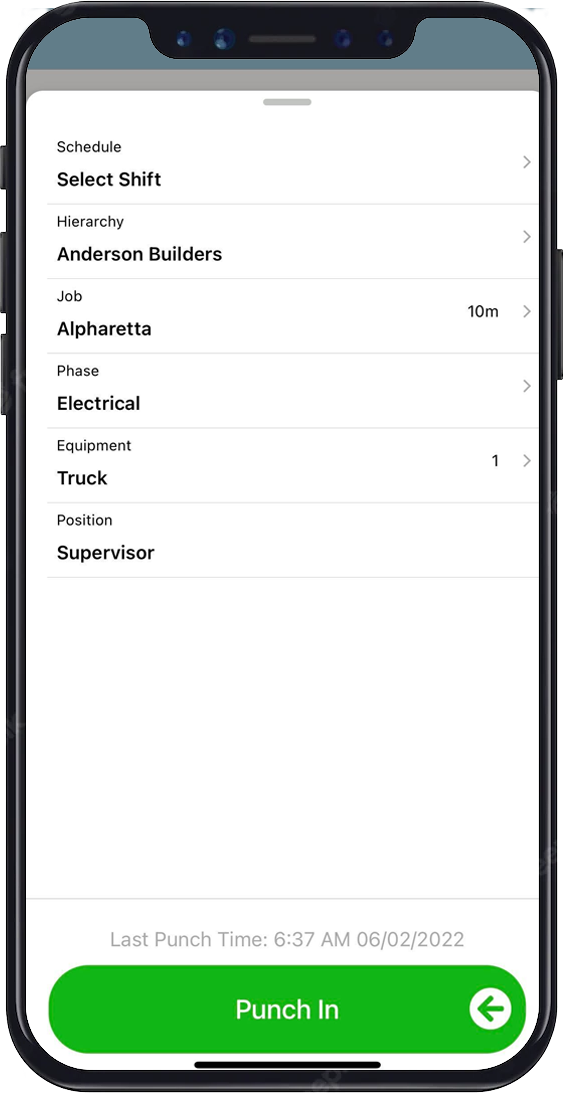
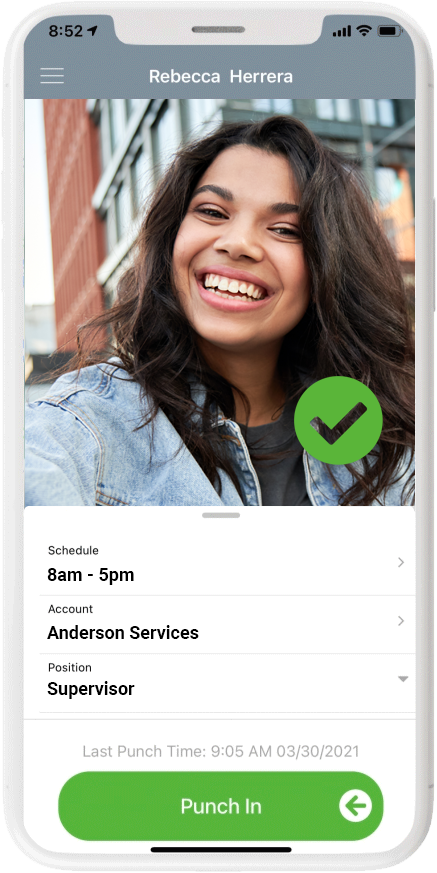
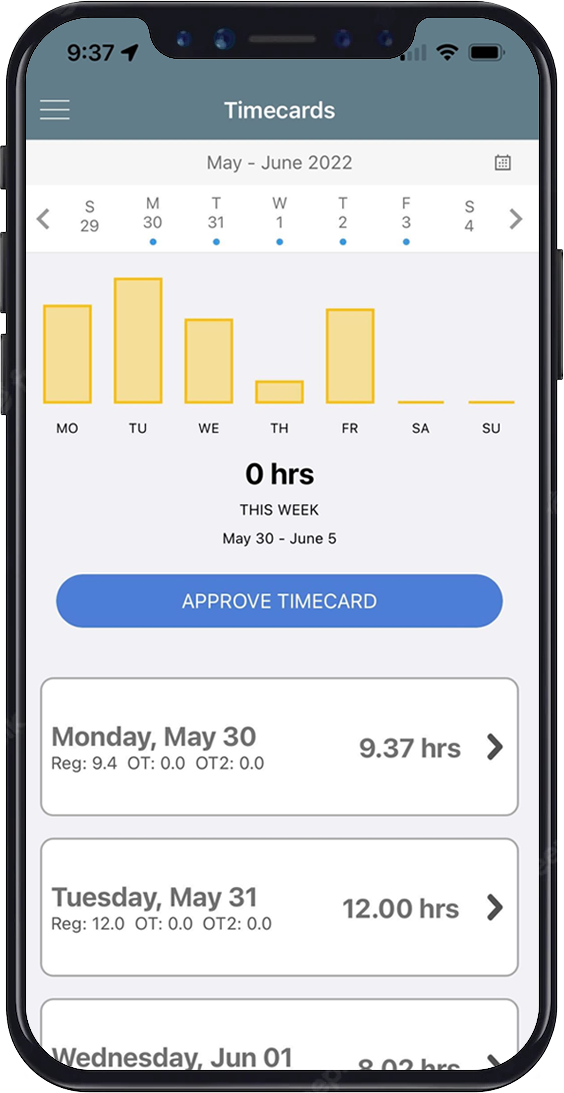
Web Punching
It is best practice to encourage each employee to use a mobile device to punch in and out of work. However, there are times where using a web interface via the browser for punching is preferred. Findd also fully supports punching via a web interface.
Facial Recognition
Biometric time systems are the only way to prevent buddy punching, ghost employees, and other forms of time fraud. The only biometric that is ubiquitous for all iOS/Android devices is facial recognition. Findd has the most advanced and well-proven facial recognition time clock in existence.
What is unique about Findd’s Facial Recognition Timeclock?
GPS Geofencing
When you allow your employees to punch in using their own devices, it is critical to know that they are punching in at the job site. When they move to a new location, making transfers should also be easy and the device should prompt them. Findd allows any hierarchy item or job to define a physical address and a geofence. When an employee punches to this location, the system will ensure they are geolocated within the location boundaries otherwise a location exception is generated for review. The best part? All of this works even if the phone doesn’t have data connectivity!
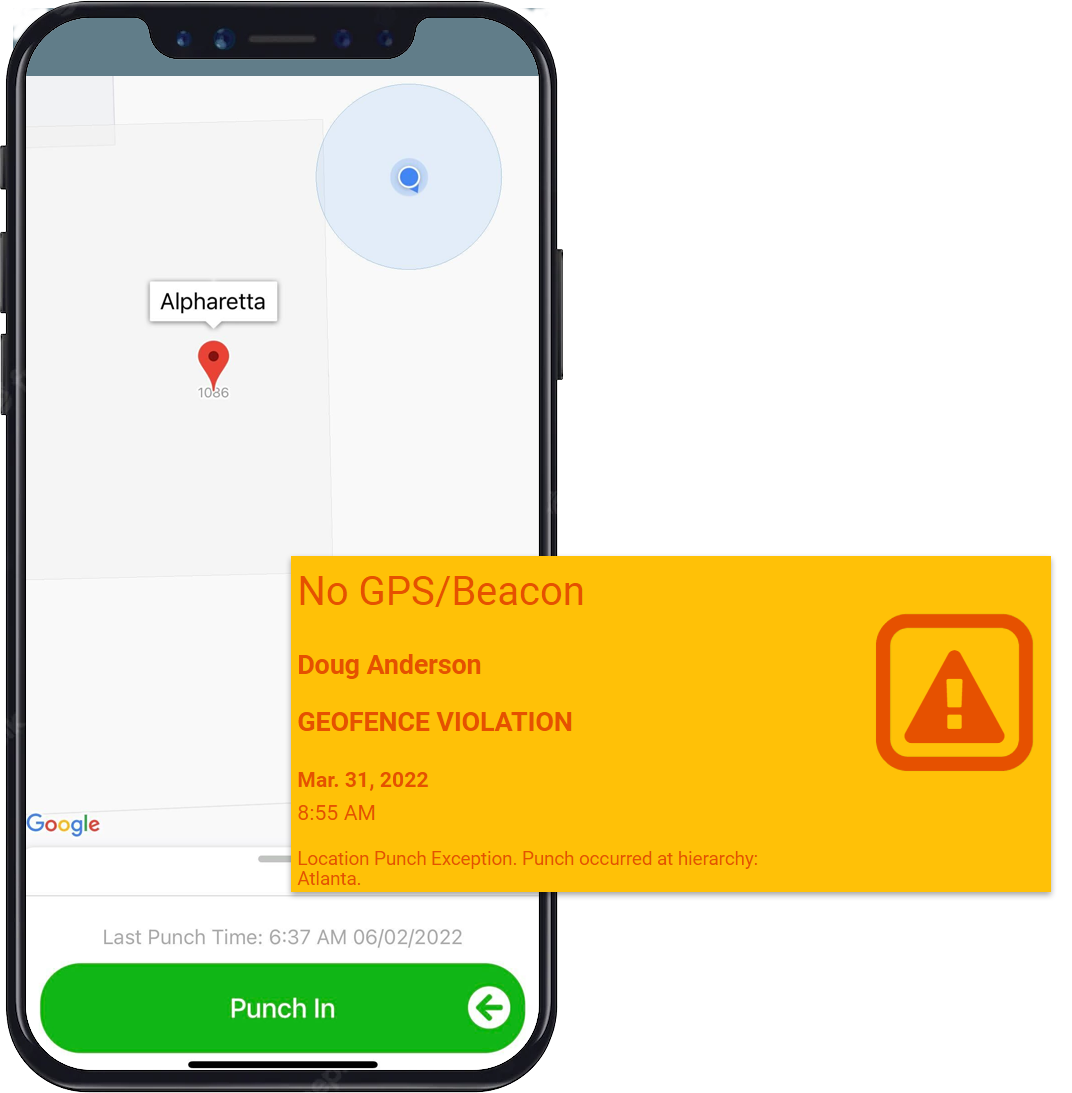
MicroLocations
GPS is fantastic when the boundaries can be large. What if you need to know that an employee is in a certain room when they punch in? Moreover, what if you need to know that they are in a certain room on the 5th floor? GPS cannot give you this level of precision. Ask us about our MicroLocation technology that can pinpoint an employee within a building using nothing more than their own device!

Employee Self Service
Your employees should be accountable for their own time tracking, time card review, schedule, job costing, leave requests, and more. Requiring employees to be responsible for their own time data will increase efficiency, reduce errors, and help to eliminate fraud. Findd supports both mobile and web self-service.
Employee Self-Service Features
Web timecard review
Payroll Preparation
The ultimate goal of any time system is to correctly categorize time for each employee and efficiently pay them accurately and on time. To this end, Findd’s time and labor management tools make this payroll preparation process simple and efficient, without sacrificing any of the complexity needed to ensure accurate job-costing data.
Dashboard
Knowing who is working, who is approaching overtime, and seeing your data at a glance is vital to making decisions as a business leader. The Findd dashboard gives you a birds-eye-view of your most critical time data.
Roles and Permissions
Organizations have administrators, supervisors, and employees that require careful management. Findd allows for powerful hierarchy-based user permissions and roles to be defined. Additionally, employees be assigned multiple supervisors with supervisors being restricted to viewing and modifying only those direct reports they have scope over. Easily define roles such as payroll manager, field supervisor, or district manager to facilitate the review, approval, and preparation for time and expense data to be exported to payroll.
Manage by Exceptions
A good software system is one that will accept large amounts of data and yet be capable of detecting any data that is not “normal”. Once detected, this data should be presented to an administrator or supervisor within their scope of responsibility to review and approve. Findd uses management by exception to do exactly this. Any punch that doesn’t fall within the configured biometric, geolocation, job-costing, and many other thresholds will be flagged and made reviewable to the proper administrator within your organization. With over 20 exception types, this keeps your administrators focused on the most important tasks, and removes the noise of data that falls within acceptable boundaries from the data that needs special attention.
Expenses
The Findd time system supports adding both money and hourly expenses. This makes reimbursing employees for expenses as well as compensating for bulk time simple and fast. Supervisors will review and approve each expense with permission to determine who has rights to various aspects of the hierarchy. Expenses can be part of the payroll export to ensure an end-to-end process from entry to payment.
Approvals
If employees and supervisors are not approving timecards daily or weekly, an organization may be missing an opportunity to remove errors and prevent fraud. Any error in time entry, job costing, missing breaks, or record keeping, gets progressively more expensive for your company the longer it goes uncorrected. If a payroll manager has paid an employee before a correction is required, this wastes an incredible amount of time for the employee, supervisor, and payroll manager. Requiring an employee and supervisor to sign off on their time helps to prevent this situation. With the Findd mobile self-service functionality, not only can an employee review and approve their timecard, they are also required to validate the timecard approval with their signature. This additional biometric ensures that the employee themselves has completely reviewed and approved all time worked.
Further, it is critical to make the employee accountable by having them sign off on their time worked for regulatory purposes. Unfortunately, labor disputes and labor audits are a headache for any organization, especially when the data isn’t clear. If your company has signed and approved timecards from each employee for 100% of all time worked, this dispute or audit becomes trivial.
Finally, accurate time data is not just a matter of paying employees correctly and protecting an organization against regulatory violations. Time data is critical to make key business decisions. If job costing information isn’t accurate, then the profitability of certain regions, jobs, and activities can be thrown off. Bad data in, bad data out. For more blue-collar companies the labor data makes up a significant portion of the overall expenses. When this isn’t accurate, the entire decision-making process as to which future work to purpose is thrown off.
Payroll Preparation Workflow
Nearly all of the efforts by employees, supervisors, and administrators culminate in reviewing, correcting edge cases, and otherwise preparing the time data for payroll processing. Every organization has processes to prepare payroll data that may be somewhat unique. With Findd, the payroll preparation module follows a best-practice approach to ensuring accurate and fraud-free time and expense data to be sent on for payment processing.
The Payroll Dashboard gives a company’s payroll group a birds-eye view of all required to export payroll data.
Note: All steps in the payroll workflow are optional. Following these steps is a matter of business policy.
Payroll Preperation Workflow Steps
1. Employee Approval
The payroll dashboard gives payroll administrators an easy way to see exactly how many timecards have been approved by employees, and which timecards are missing employee approval.
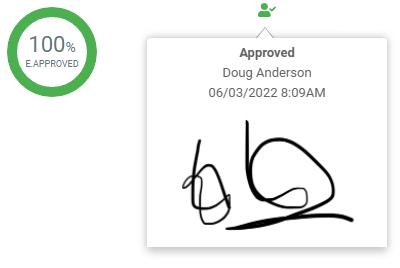
2. Supervisor Approval
Supervisor approval is the best way to ensure accurate job costing and time data. The payroll preparation dashboard provides an easy way see view which timecards have not yet been approved, and which supervisors are responsible for these timecards.
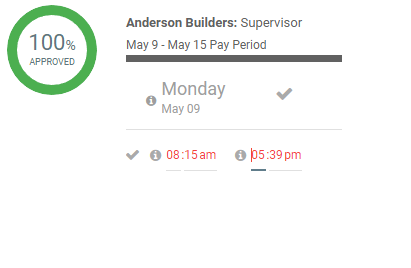
3. Locking
Once all timecards have been reviewed and approved by both the employee and supervisor, the payroll hierarchy group is ready to be locked. Locking a payroll hierarchy ensures no further edits or changes can be made. Because specific sub-sections of the organization can be locked, this allows for a progressive preparation where portions of the company can be finished before others.
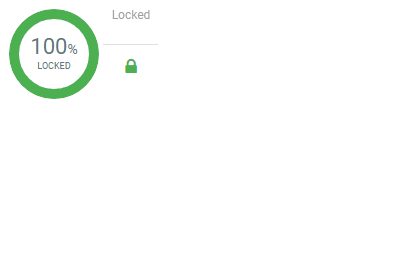
4. Closing
Once a pay period is locked and ready for payroll processing, the pay period must be closed. Although a pay period can be unlocked, once a pay period is closed it cannot be undone. Closing will process all accruals and finalize all payroll rules. Any mistakes or changes for this pay period are rectified in a future pay period either as an expense entry or using the built-in prior period adjustments module.
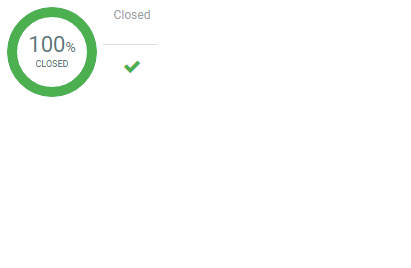
5. Exporting
Once the payroll has been locked and closed, it is important to include a step to officially export the payroll data to the payroll system with an audit for who conducted this action. Additionally, once the export is triggered a copy of the payroll file is logged within Findd to ensure traceability of the data in the future. Note that the payroll export is customized to precisely fit the receiving payroll system. The payroll export is typically a file, such as a CSV file, or an export directly to the payroll system using an API or other means.
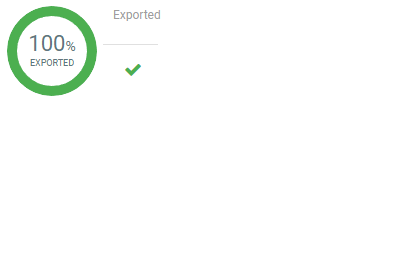
Prior Period Adjustments
It is inevitable that some mistakes in payroll may be processed. If a mistake occurs, it is best practice to immediately correct the prior period while retaining an unimpeachable record of the actual time and expense data that was paid. Once the correction is made, these changes must be added to a future pay period to rectify the mistake.
The Findd Prior Period Adjustments feature allows for exactly this process.
Any user with permission for prior period adjustments can find the past timecard, make any edits to time and expense to correct the record, and a copy of the original timecard will be preserved. The system will compare the copy timecard which contains the edits with the original timecard and produce a set of differences between the two. Of course, these differences often include regular time. The important capability of these difference calculations is that they also include ALL pay types including overtime, double-time, shift differentials, paid time, non-paid time, etc.
In other words, the prior period adjustment will calculate the difference between what was exported and what should have been exported to payroll and include those differences in the future pay period as expenses.
Once the prior period is adjusted, these changes are easily seen in an audit trail in both the previous timecard data, as well as the future timecard that will contain the corrections.
Finally, multiple correction sessions are allowed if a timecard needs to be corrected multiple times.
The prior period adjustments feature is one of the most simple yet powerful features in the Findd Time Tracking System.
Data Export
Time collection defines how labor is allocated within any organization. For most organizations, labor is one of the largest expenses. Fully understanding the labor data is critical to making good decisions leading a company to growth and high profitability. Getting full access to all relevant data via data export is a critical step to analyzing this data in order to make good business decisions.
Reports
Findd offers built-in reporting for timecards, payroll, employees, locations, and more! Reports are typically the first option when it comes to data export. From reviewing complex data in a CSV file, to sending a client a PDF punch record report by location, the Findd time system has many inline reports to meet your needs.
Custom Reports
It is inevitable that built-in reports will miss some key data or filters required by your company. Findd offers services to add custom reports to your account to accommodate any of your reporting needs. From custom payroll export formats to custom timecard, location, or client reports, Findd can create additional reports to handle any situation.
Employee Files
It may seem trivial, but allowing employees to securely download external files from the Findd mobile application can be an important solution to many data export problems. From paystubs to employee agreements, Findd can receive and store key files that your employees need access to.
Scheduled Jobs
Within any software system, there are limitations to the current feature set. In particular, time systems can be configured in countless ways. Each business has unique requirements, rules, and processes that make any single software solution fall short. Scheduled Jobs is Findd’s answer to this issue. Scheduled jobs are configurable recurring jobs that can take any number of tasks. From scheduled custom reports delivered via email or text, to data manipulation following business rules, scheduled jobs allow for your organization to extend the existing functionality of Findd to ensure the time platform can operate to solve your unique set of problems.
ETL
Extract, Transform, and Load (otherwise known as ETL) is the ability to move data on an interval to an external data warehouse. If your company would like to set up an ETL process with Findd, this is something that can be configured.
REST API
In the end, API access is the ultimate path to gaining full access to al of the data Findd contains relevant to your company. Findd has an open API that can be utilized by your company to push and pull data.
Because the API is RESTful, any organization is free to build its own external tools to access this data.
From home-grown ETL solutions to driving advanced BI reporting and dashboards, to even creating a custom mobile application, the sky’s the limit using the exposed API. Contact us to find out how easy it is to set up API access for your account.
You run your business. We’ll do your time keeping.

